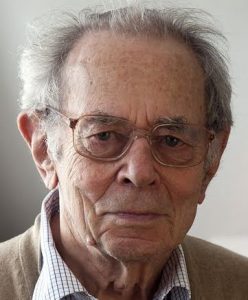János Kornai
He is primarily known as an economist, but in the early 1960s he worked in the Cybernetics Research Group (KKCS) of the Hungarian Academy of Sciences, where he led the first economic mathematical modeling work, first on the M-3 and later on the Ural-2 machine.
From 1953 he studied for the degree of Candidate of Economic Sciences. From 1955 he was a member of the Institute of Economic Sciences of the Hungarian Academy of Sciences. He was expelled from the institute due to the topic of his candidate's thesis, "The Excessive Centralization of Economic Management", which he defended in 1956. At that time, he began to deal with the processing of the results of Western economics.
In 1958 he was appointed head of department at the Textile Research Institute. Between 1963 and 1967 he was head of department and researcher at the Computer Science Center of the Hungarian Academy of Sciences. In 1967 he returned to the Institute of Economics of the Hungarian Academy of Sciences as head of the Department of Economic Regulation Theory.
He received his university doctorate in 1961 and his MTA doctorate in 1965. He was later appointed as a research professor at the Institute of Economics of the Hungarian Academy of Sciences.
Visiting professor at several foreign universities. Professor of Economics at Harvard University from 1986, then Professor Emeritus (since 2002). In 1992, one of the founders and leading researcher of the Collegium Budapest Institute for Advanced Study. Since 2005, Research Professor at Central European University (CEU). Since 2011, lecturer at Corvinus University of Budapest (BCE), then Professor Emeritus.
He was elected a corresponding member of the Hungarian Academy of Sciences in 1976 and a full member in 1982. He was also a member of the American Academy of Sciences and Arts, the British Academy, the Royal Swedish Academy of Sciences, the Finnish Academy of Sciences, the Russian Academy of Sciences, and the Bulgarian Academy of Sciences. Since 2016, he has been a foreign member of the National Academy of Sciences of the United States.
He is a member of the editorial board of Acta Oeconomica, Acta Oeconomica and Közgazdasági Szemle. He was Vice-Chairman of the UN Development Programme between 1972 and 1977, President of the International Econometric Society in 1978, President of the European Economic Society in 1987, and President of the International Economic Society in 2002. He was a member of the Central Bank Council of the Hungarian National Bank between 1995 and 2001.
His main research areas are the socialist economic system, non-equilibrium systems and post-socialist transition. Following his decades of research activity, which began in the 1950s, he became the best-known researcher in the analysis of the socialist economic system. He published his results in several influential books and journal articles. He was the first to apply the emerging tools of mathematical (linear) programming to solve problems related to the optimal economic structure of our country.
His main awards: Academic Award (MTA. 1970, 1974); FE Seidman Award (USA, 1982); State Award (1983); Alexander von Humboldt Award (FRG, 1983); Erasmus Medal (Academy of Europe, 1992); Grand Prize and Ferenc Deák Award (Pro Renovanda Cultura Hungariae Foundation, 1994); Széchenyi Award (1994); Officer of the French Order of Honor (1997); Award for the Fame of the Hungarians (1997); John von Neumann Medal (László Rajk College of Technology, 1997); Prima Primissima Award (supported by the National Association of Entrepreneurs, 2005); Middle Cross of the Order of Merit with the Star of the Hungarian Republic (2007); Leontief Medal (Leontief Centre in St. Petersburg, 2010); Grand Cross of the Order of Merit of the Republic of Hungary (2010); Hazám Award (21st Century Society, 2013); Open Society Award (Central European University, 2018).
- He is one of the founders of Collegium Budapest.
- In 2005, he was made an honorary citizen of Budapest.
- His autobiographical volume was published in 2005 under the title “With the Power of Thought” (Osiris Publishing, Budapest).
Created: 2019.04.25. 08:50
Last modified: 2024.06.04. 11:18

